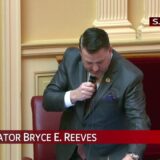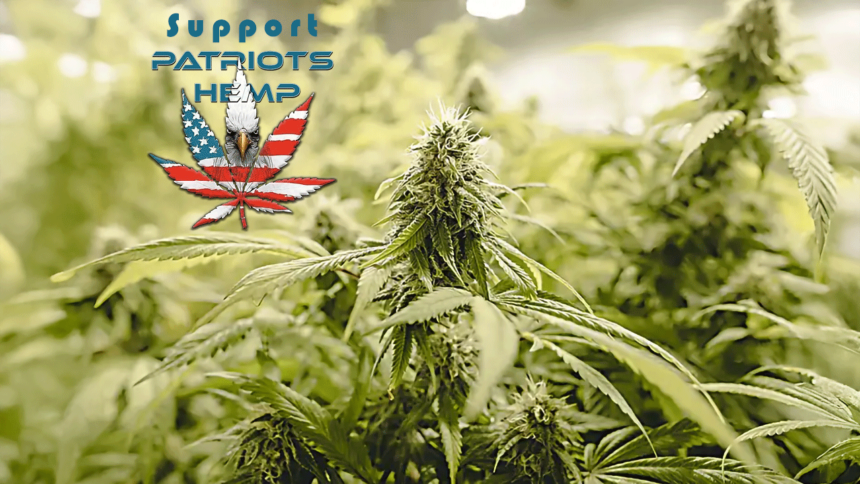As Election Day approaches, drug policy has again emerged as a key campaign issue for incumbent President Joe Biden and former President Donald Trump—with each candidate’s policy positions around marijuana coming back into focus.
Biden’s campaign is hoping to leverage the popularity of cannabis reform, highlighting his mass pardons and scheduling review directive that has led the Justice Department to recommend moving marijuana from Schedule I to Schedule III of the Controlled Substances Act (CSA). That said, his ongoing opposition to broader legalization and his well-established history as a drug warrior in the Senate may again come into play for voters.
How Trump will navigate the issue is less certain, though he’s generally indicated over the past year that he intends to position himself as an anti-drug candidate, proposing extreme policies such as giving the death penalty to people who sell illegal drugs. His record on cannabis specifically is mixed, however, and he’s been known to vacillate on various positions, depending on when he’s asked about the issue.
As the presidential rematch heats up, it’s likely the candidates will be pressed once again on cannabis, warranting a revisitation of their records.
Here’s a review of drug policy actions taken by Biden and Trump as president:
Biden
Since taking office, Biden has issued two rounds of mass marijuana pardons, granting formal forgiveness to thousands of people who’ve committed low-level cannabis offenses. The action is largely symbolic, and the president has faced criticism from advocates over his prior exaggerated claims about the practical impact of the reform, as well as the fact that certain people (e.g. immigrants and people with non-violent marijuana sales convictions) were excluded from the relief.
Biden finally recognized that the pardons he issued did not expunge prior records in May after previously falsely claiming they did. The administration did facilitate a process to give pardon recipients a Justice Department certification to document it, but those records are still accessible and could theoretically affect eligibility for employment and housing, for example. As congressional researchers have pointed out, however, the president does not have authority to unilaterally seal federal records.
“No one should be in jail merely for using or possessing marijuana” has become a common talking point for the president. In a historic move, he even made that point during his 2024 State of the Union address, indicating that he recognizes the popularity of the issue and the political benefits of associating himself with reform in the run-up to the election.
But Biden remains out of step with the majority of voters—particularly those in his own party–when it comes to broader legalization. And while he directed a review into cannabis scheduling that resulted in a Schedule III reclassification proposal, that would not federally legalize marijuana. It would, however, remove certain research barriers and free up state-licensed cannabis businesses to take federal tax deductions.
Biden also signed a bill into law in late 2023 that was meant to streamline marijuana research—the first time that a president enacted standalone cannabis reform legislation.
After the U.S. Department of Health and Human Services (HHS) recommended rescheduling cannabis, and the DOJ agreed with that assessment, the Biden-Harris campaign was quick to promote the administration’s role in that decision. In email blasts, the campaign contrasted Biden’s marijuana actions with those of the Trump administration, emphasizing that federal enforcement guidance that urged discretion with state cannabis laws was rescinded under Trump.
That said, the Biden administration has not issued updated guidance, despite comments from Attorney General Merrick Garland about the department’s intent to do so.
Also, while top officials at DOJ, HHS, the White House Office of National Drug Control Policy (ONDCP) and other agencies have applauded the president’s work to reform federal marijuana policy, the administration has faced criticism for other anti-cannabis actions, such as DOJ’s consistent defense of a ban preventing cannabis consumers from owning guns in the face of multiple federal lawsuits challenging the constitutionality of that policy.
Also under Biden, U.S. Customs and Border Protection (CBP) has faced scrutiny for using resources to seize cannabis from state-legal businesses in New Mexico.
Another key criticism from advocates and lawmakers concerns the administration’s budget requests, which have all proposed maintaining an appropriations rider blocking Washington, D.C. from using local tax dollars from legalizing marijuana sales, despite voters in the District approving legalization a decade ago.
Recently, the White House said Biden “commends and welcomes” the mass pardons issued at the state level by Maryland Gov. Wes Moore (D). The president had encouraged governors to follow his lead with cannabis clemency.
The White House has also come out against a House-passed proposal to prevent military branches from testing for marijuana for enlistment or commission as part of a large-scale defense bill, calling cannabis use a “military readiness and safety concern.”
However, the president signed an earlier version of the National Defense Authorization Act (NDAA) that contains provisions to fund clinical trials into the therapeutic potential of psychedelics for active duty military service members.
Early in 2021, meanwhile, the Biden administration came under fire after it was reported that it had terminated or otherwise punished dozens of staffers who admitted to prior marijuana use as part of their background check process.
Trump
As president, Trump largely stayed true to his position that marijuana laws should be handled at the state-level, with no major crackdown on cannabis programs as some feared after then-Attorney General Jeff Sessions rescinded the Obama era federal enforcement guidance. In fact, Trump criticized the top DOJ official and suggested the move should be reversed.
While he was largely silent on the issue of legalization, he did tentatively endorse a bipartisan bill to codify federal policy respecting states’ rights to legalize.
Trump eventually forced out Sessions from the top spot at DOJ, replacing him with William Barr, who at points indicated the department should not waste resources on enforcing prohibition in legal states but also faced internal criticism for leading investigations into cannabis industry mergers that were reportedly borne out of a personal animus for marijuana.
While Trump has spoken out in favor of medical cannabis legalization, on several occasions he released signing statements on spending legislation stipulating that he reserved the right to ignore a long-standing rider that prohibits the Justice Department from using its funds to interfere with state-legal medical marijuana programs.
While in office, Trump also signed “Right to Try” legislation into law to allow terminal patients to access drugs that haven’t been approved by the Food and Drug Administration (FDA) but have cleared a phase one trial—a move that some advocates said would let a limited number of people use marijuana, psilocybin and MDMA for therapeutic reasons.
He also gave final approval to a bipartisan resentencing bill affecting drug cases, as well as large-scale agriculture legislation that included provisions legalizing hemp containing up to 0.3 percent THC by dry weight.
However, while he did issue a number of pardons and commutations for people convicted of certain drug offenses—and at points seemed to sympathize with people with substance misuse issues—he’s expressed extreme drug policy views when it comes to illicit trafficking.
Trump reelection officials also issued a cease and desist letter in 2020 demanding that Mississippi medical cannabis activists stop using the then-president’s name to campaign for their ballot initiative—despite the fact that the advocates accurately quoted his repeated comments in support for medical marijuana.
Another controversial administrative action concerned immigrants and marijuana. In April 2019, U.S. Citizenship and Immigration Services issued a memo stating that using marijuana or engaging in cannabis-related “activities” such as working for a dispensary—even in states where it’s legal—makes immigrants ineligible for citizenship because it means they don’t have “good moral character.”
In December 2019, the Justice Department issued a notice that it was seeking to make certain marijuana offenses, including misdemeanor possession, grounds to deny asylum to migrants.
During the course of his failed 2020 reelection bid, Trump’s campaign made clear it wanted to depict him as the criminal justice reform candidate, repeatedly attacking Biden over his record as an “architect” of punitive drug laws during his decades in the Senate, for example.
Here’s an overview of the candidates’ records on marijuana issues outside of the Oval Office:
Biden
While Biden has increasingly promoted marijuana policy reform as president, during his time in the Senate he served as chair of the influential Judiciary Committee that helped shape U.S. drug policy during an era of heightened scaremongering and criminalization. And he was among the most prominent Democratic drug warriors in Congress for decades.
He’s sponsored some of the country’s most punitive drug legislation, including the notorious 1994 crime bill—even though in some cases, he has addressed the consequences of his anti-drug legislative activism.
Biden introduced the Comprehensive Narcotics Control Act of 1986. The wide-ranging anti-drug legislation called for the establishment of a cabinet position to develop the federal government’s drug enforcement policies—a role that fits the description of the “drug czar” position, a term the senator coined in 1982 and which was subsequently created to lead ONDCP.
Shortly after announcing his presidential candidacy, Biden came out in support of decriminalizing marijuana, legalizing medical cannabis, expunging the records of individuals with prior cannabis convictions and allowing states to set their own marijuana policies. A spokesperson also said that he favors rescheduling marijuana to Schedule II—but he’s since backed the DOJ assessment that it should be moved to Schedule III.
Biden found himself in hot water in November 2019 by arguing that marijuana may be a gateway to more dangerous drugs and that’s partly why he opposes legalization.
Trump
It might come as a surprise, but 30 years ago, Trump argued in favor of legalizing all drugs. He’s since dramatically shifted on that position.
“We’re losing badly the war on drugs. You have to legalize drugs to win that war. You have to take the profit away from these drug czars,” he said at the time. “What I’d like to do maybe by bringing it up is cause enough controversy that you get into a dialogue on the issue of drugs so people will start to realize that this is the only answer; there is no other answer.”
Then, 25 years later, he was at the Conservative Political Action Conference stating that he thinks marijuana legalization is “bad” and that he feels “strongly about that.”
“They’ve got a lot of problems going on right now in Colorado, some big problems,” he said.
But the candidate clarified that he supports states’ rights to set their own marijuana laws, saying, “If they vote for it, they vote for it.”
“Medical marijuana is another thing,” he added. “I think medical marijuana, 100 percent.”
In April 2023, Trump suggested that there may be a link between the use of “genetically engineered” marijuana and mass shootings.
“We have to look at whether common psychiatric drugs, as well as genetically engineered cannabis and other narcotics, are causing psychotic breaks” that lead to gun violence, he said.
Trump seemed confused during an interview in June 2023 when he was confronted with the fact that his proposed plan to impose the death penalty on drug traffickers would have condemned a woman he pardoned and promoted as an example of a key criminal justice reform achievement during his administration.
He first defended his extreme position that drug traffickers should be quickly convicted and executed, touting countries like China and Singapore for enforcing the lethal penalty against drug offenders. The candidate said that capital punishment “is the only way you’re going to stop” addiction.
The interview host contrasted that position with the president’s support for bipartisan sentencing reform legislation, the First Step Act, that he signed into law in 2018. The host asked Trump about criticism that the reform led to the early release of certain individuals involved in drug trafficking who subsequently committed violent crime.
“But I focused on non-violent crime,” Trump said, citing his presidential commutation and pardon of Alice Johnson as an example. He said that Johnson, who was sentenced to life in prison without the possibility of parole over her role in a cocaine trafficking ring in the 1990s, “got treated terribly” and “unfairly,” equating her treatment to his own as he faces multiple federal counts over alleged violations of the Espionage Act.
He announced plans in January 2023 to “destroy the drug cartels.” And he reportedly asked advisors about the possibility of utilizing a military option to take action against drug trafficking organizations in Mexico.
Analysis
Both presidential candidates have mixed records that leave them open to criticism from advocates, but Biden’s trajectory has been trending strongly toward reform since he took office. Trump’s position on marijuana specifically remains somewhat opaque, though so far he’s given no indication that he would push for pro-cannabis policies if he got another shot at the White House—and he’s ramped up anti-drug rhetoric on the campaign trail.
There’s also been an open question about where Trump will fall on a state-level legalization initiative that he’ll get a chance to vote on this November as a Florida resident. “I believe it has always been his position that the states should decide,” Roger Stone, a Republican consultant and longtime ally of Trump, told Marijuana Moment in April. However, he added: “I don’t know that he personally would vote for this.”
The candidates do seem aligned on at least one issue: States should have the right to set their own cannabis policies without federal interference.
While Biden has campaigned on his marijuana pardons and scheduling directive, however, he’s made clear he’s not interested in going further by granting clemency to people with convictions for sales or cultivation, for example. He also remains opposed to adult-use legalization.
With polling consistently showing Americans support ending prohibition, it remains to be seen whether that might factor in to the thinking of either candidate as they move forward with their campaigns. The issue might be more popular among Democrats, but the surveys have indicated the either candidate would stand to benefit from embracing reform.
NCAA Votes To Remove Marijuana From Banned Substances List For College Athletes






















